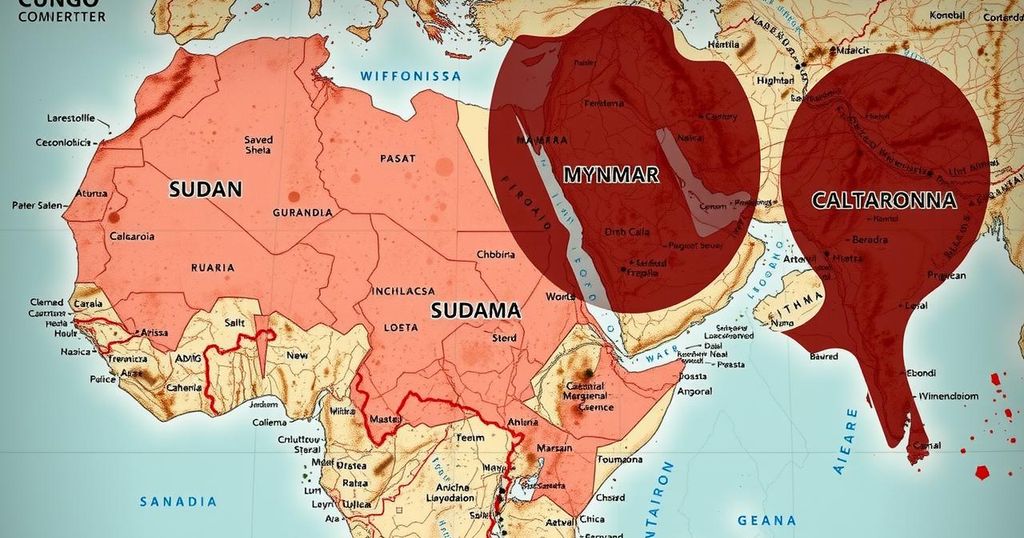The ongoing conflicts in Sudan, Myanmar, and the Democratic Republic of the Congo pose severe humanitarian crises. Sudan faces airstrikes and food insecurity, with genocide accusations against the RSF. Myanmar struggles with military oppression and a flawed census, while the DRC sees violence from armed groups over mineral control. The international community must intervene to protect civilians and promote accountability.
The ongoing conflict in Sudan, now in its 20th month, has resulted in significant devastation and a humanitarian crisis for the civilian population. Recent escalations by the Sudanese Armed Forces (SAF) against the Rapid Support Forces (RSF), including deadly airstrikes, have exacerbated the situation. In Darfur, violence remains rampant, with numerous civilian casualties documented, and the United States has deemed the targeted killing of ethnic groups in the region as acts of genocide, leading to sanctions against RSF leader Mohamed Hamdan ‘Hemedti’ Dagalo.
Acute food insecurity affects over half of Sudan’s population, with famine conditions reported in various regions. According to the Integrated Phase Classification (IPC), the situation is expected to deteriorate further, highlighting the dire need for humanitarian assistance. Edem Wosornu from the UN Office for the Coordination of Humanitarian Affairs underscored the urgent need for international action to protect civilians amidst escalating violence and humanitarian neglect.
In Myanmar (Burma), the military continues its violent crackdown on ethnic resistance forces, while a controversial census was recently conducted amid the ongoing conflict. This census highlights long-standing issues regarding the recognition of diverse ethnic groups, including the Rohingya, who have faced genocidal acts. Civilians suffer great hardships, including food insecurity, largely due to the military’s restrictions on humanitarian aid.
In the Democratic Republic of the Congo (DRC), the UN Security Council has renewed the peacekeeping mission, MONUSCO, in response to increased violence from armed groups vying for control of mineral resources. With thousands displaced and human rights violations on the rise, there is growing pressure on both local and international actors to take steps toward peace and accountability, including responsibility from corporations utilizing conflict minerals.
The current crises in Sudan, Myanmar, and the Democratic Republic of the Congo stem from prolonged conflicts involving military and armed groups, resulting in widespread humanitarian disasters. Sudan faces escalating attacks amid a civil war, leading to severe famine and widespread atrocities documented by international human rights organizations. Myanmar is grappling with the aftermath of a military coup, which has denied basic human rights and resulted in severe humanitarian conditions, particularly for ethnic minorities. The DRC’s situation reflects a historical struggle over mineral wealth, fueling armed conflict and human rights violations, highlighting the urgent need for international intervention and effective governance.
The situations in Sudan, Myanmar, and the Democratic Republic of the Congo are critical and demand immediate and coordinated international response. The need for ceasefires, adherence to international law, and the protection of vulnerable populations is paramount. As humanitarian crises escalate, fostering dialogue among conflicting parties and holding perpetrators accountable are essential steps toward achieving lasting peace and justice in these regions.
Original Source: www.globalr2p.org






